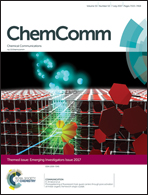Mesoporous titanium and niobium nitrides as conductive and stable electrocatalyst supports in acid environments†
Abstract
The stability of carbon-based catalyst supports represents one of the biggest challenges for the commercialisation of proton-exchange membrane fuel cells (PEMFCs). Metal nitrides are an attractive alternative to carbon-based supports, owing to their high bulk conductivity and acid stability. We report the electrochemical stability evaluation of high-surface-area metal nitrides in acidic electrolytes. Three-dimensional mesoporous titanium (TiN) and niobium nitride (NbN) thin films were prepared using block copolymer self-assembly and were evaluated without using any conductive carbon additives or a carbon-based substrate. Both TiN and NbN are stable and maintain conductivity in acidic electrolytes up to at least 0.85 V (NbN) and 1.4 V (TiN) vs. reversible hydrogen electrode (RHE) after 2000 cycles. We also deposited platinum on the TiN films and demonstrate the expected cyclic voltammogram features, indicating the nitride's utility as a catalyst support.

- This article is part of the themed collection: 2017 Emerging Investigators


 Please wait while we load your content...
Please wait while we load your content...